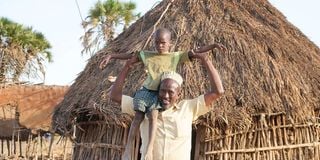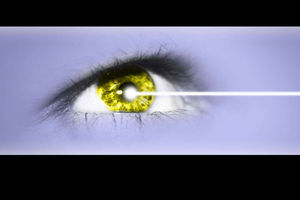Vision for boy born with blindness-causing eye disorder restored

Omar Mohammed lifts his son Abdul Nassir shoulder high in Galili Village, Tana River County, as they celebrate the restoration of his sight following a successful surgical procedure.
What you need to know:
- Nassir suffered from congenital cataract, a condition where the lens of the eye is opaque instead of being clear.
- This hinders vision and if not countered on time before the child is seven years old, a child develops complete blindness.
For four years, five-year-old Abdul Nassir from Galili in Tana River County lived in a world of darkness, depriving him of the joy of being a child.
He suffered from congenital cataract, a condition where the lens of the eye is opaque instead of being clear. This hinders vision and if not countered on time before the child is seven years old, a child develops complete blindness, according to Dr Stanley Samoei, an ophthalmic clinical officer at Coast General Teaching and Referral Hospital.
Nassir’s father, Omar Mohammed, tells Healthy Nation that it wasn’t until their son was about two years old that they noticed he could be having eye-sight issues.
"He would knock himself on visible things. We thought it was normal for a child learning to walk but then realised his case was quite unusual," Mohamed says. He took him to a local dispensary for check-up and a nurse advised him to go to an eye specialist in Lamu.
The journey from his home in Galili village to Lamu is more than 180 kilometres, with half of that distance travelled on a motorbike as there are no vehicles plying that route. "I had to look for transport, which was hectic. I do not have a job to sustain me with my two wives and 17 children," Mohamed says.
He had two options, to either feed his family or take his son to hospital. It took him a year to decide on what to do. All this time, Nassir kept living with his condition.
Mohammed says his burden was heavier as four of his children suffered from various disabilities and they all needed medical attention.
"I sell firewood. On a good day, it pays, on a bad day it fails me and I have to come back home empty-handed, which would hurt me a lot," he narrates. However, he managed to go to Lamu and was informed that his son was suffering from partial blindness and would need an operation.
This would cost him Sh180, 000 exclusive of other travel expenses, food and accommodation in Mombasa, where the surgery was to be done.
"I gave up and enrolled my son in school. He suffered and I would watch him fall several times or knock his head on a tree every time he tried to run or follow his age mates.”
Mohammed knew that for his son, the die had been cast, and he was going to count another child with a disability in his house. However, a few months later, the Kenya Ports Authority mobile medical clinic visited the village to carry out free check-ups.
The father thought he should try his luck as he received information that it was free. "The doctor examined him and told me where the problem was. His explanation was very clear and he gave me more hope when he told me the surgery would be sorted out," he says.
However, he had to seek the consent of his wife regarding the offer, and as he feared, she objected to the idea.
"I was afraid for my child since I thought things would go wrong and he would become totally blind. It was better having him partially blind — you can give him a plate of food and he will see it and eat," says Nassir’s mother Halima Baroba.
After long deliberations and a lot of pleading from the husband, she gave in and the child was taken to LightHouse for Christ Hospital in Mombasa for the procedure. Now it is barely five months since Nassir’s sight was restored and his joy is manifested in the village.
Nassir runs across the village in jubilation with his peers. He is in every corner of the village to manifest his miracle, a sight restored.
According to Nassir’s elder brother, on his first day of reporting to school after the procedure, he took him to a ditch and stood there staring for a while.
"He told me, my brother, this is the ditch I kept falling in every day when I was coming to school, now I can see it clearly," recounts Nassi’r brother..
According to Dr Samoei, Nassir was nearly developing amblyopia, absolute blindness, had he not undergone the surgery on time.
Dr Samoei tells Health Nation that the cause of congenital cataracts is not known but is suspected to be hereditary.
Also, he notes that the condition is the leading cause of avoidable blindness in children as it accounts for 60 per cent of the cases across the country.
He notes that for Nassir, surgery is not enough as he has to undergo refraction to achieve the best vision.





